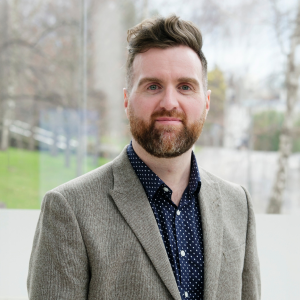| Project Title |
Co-Designing Gender-Affirming Nursing/Midwifery Education |
| Supervisor |
Dr Sean Kearns
|
| Email address |
|
| Summary |
This PhD project will explore and respond to the education needs of nurses and midwives working with transgender and gender diverse (TGD) individuals. Through collaborative and participatory research approaches, the study will bring together TGD community members, nurses, midwives, and educators to co-design a gender-affirming education resource for use in practice. By identifying barriers and enablers to inclusive care, developing a user-informed prototype, and piloting it in healthcare settings, the research will contribute to health equity and person-centred practice. The project will embed lived experience and practitioner insight into education development and inform future CPD and curricula. This project requires a person with a strong commitment to inclusion, social justice, and co-creating change in healthcare education. |
| Recommended Reading |
Parker, G., Kelly, L., Miller, S., et al. (2023). Taking up the challenge of trans and non-binary inclusion in midwifery education: Reflections from educators in Aotearoa and Ontario Canada. Midwifery, 118, 103605. (opens in a new window)https://doi.org/10.1016/j.midw.2023.103605 Sherman, A. D. F., McDowell, A., Clark, K. D., et al. (2021). Transgender and gender diverse health education for future nurses: Students’ knowledge and attitudes. Nurse Education Today, 97, 104690. https://doi.org/10.1016/j.nedt.2020.104690 |
| Essential Eligibility |
|
| Desirable criteria |
|
Introduction
The UCD School of Nursing, Midwifery and Health Systems (SNMHS) is offering funded scholarships for entry into the PhD programme with registration commencing in September 2025.
We have outlined specific PhD projects, please read the project summaries carefully. Where a project interests you and is related to your area of expertise please apply using the application process outlined on the previous page.
If you have any informal queries in relation to the projects described below, please email the supervisor connected to that project.
| Project Title |
The role of Brain Health Clinic (BHC) in mitigating risk factors for cognitive decline |
| Supervisor |
Professor Corina Naughton
|
| Email address |
|
| Summary |
There is growing recognition that dementia may be preventable in up to 40% of cases (Lancet 2024). Brain health and manipulation of modifiable risk is an exciting area of clinical practice and research. A new health service innovation is the establishment of Brain Health clinic to support people to reduce modifiable brain health risks (Butters et al 2025). These clinics are at an early phase of development in Ireland and this is an exciting opportunity to influence the clinic model and brain health promotion. The PhD candidate with work with the PI and supervisory team to better understand the role and effect of these clinics. The research questions will include: The research questions:
|
| Recommended Reading |
Butters AF, Blackman J, Farouk H, Meky S, A Newson M, Lemke T, Rosewell N, Selwood JA, Turner NL, Coulthard EJ, Archer HA. Brain health clinics - An evolving clinical pathway? J Prev Alzheimers Dis. 2025 Mar;12(3):100051. doi: 10.1016/j.tjpad.2024.100051. Lancet Commission 2024 Dementia prevention, intervention and care, ttps://www.thelancet.com/journals/lancet/article/PIIS0140-6736(24)01296-0/fulltext |
| Essential Eligibility |
|
| Desirable criteria |
|
| Project Title |
Understanding the lived experiences and meaning of virtual wards amongst patients and family carers in Ireland |
| Supervisor |
Dr Andrew Darley
|
| Email address |
|
| Summary |
The research project will capture in-depth experiences from patients who have received virtual ward care and family carers who have supported them following an acute health event. The study will explore their psychosocial experiences, identifying both benefits and challenges of virtual wards and what this model of care signified in their experience of illness. The findings will provide valuable evidence-based recommendations for improving virtual ward design, ensuring they are patient-centred, accessible, and supportive for both patients and carers in Ireland. This research has the potential to shape healthcare policy and practice by healthcare professionals and managers, academics, technology developers, policy makers and other key stakeholders about the personal experience and impact of virtual wards. This study will contribute to the growing field of digital health research, ensuring that virtual care models in are developed with a nuanced understanding of patient and family carer needs, both in Ireland and internationally. |
| Recommended reading |
Dainty, K.N., Seaton, M.B., Estacio, A., Hicks, L.K., Jamieson, T., Ward, S., Yu, C.H., Mosko, J.D. and Kassardjian, C.D. (2022) Virtual specialist care during the COVID-19 pandemic: multimethod patient experience study, JMIR medical informatics, 10(6), p.e37196. HSE - National Virtual Ward Programme (opens in a new window)https://www.hse.ie/eng/about/who/strategic-programmes-office-overview/national-virtual-ward-programme/ |
| Essential Eligibility |
|
| Desirable criteria |
|
| Project Title |
Realist Evaluation of the Newborn Screening Programme in Ireland |
| Supervisor |
Associate Professor Hasheem Mannan
|
| Email address |
|
| Summary |
Early detection of any disease is a known indicator for better clinical outcomes and quality of life, as it facilitates earlier treatment and better management of a condition. The Irish Newborn Bloodspot Screening Programme (NBSP) currently only screens for 8 conditions. This is despite the technological and laboratory advances, which the possibility of screening for essentially any genetic disorder for which is there a known and identifiable genetic cause. To put the Irish NBSP in context, the average number of conditions screened in EU countries is in the 20™s with Italy screening 40. This PhD project seeks to provide significant evidence towards these criteria, with the potential of wide-reaching implications and impact across the Island of Ireland, allowing every newborn child in Ireland the opportunity to be screened for additional conditions and earlier intervention, promoting healthy lives well-being for all, at all ages. The Irish Newborn Bloodspot Screening Programme (NBSP) is currently designed to detect eight rare conditions that, diagnosed and treated early in the life-course, can offset otherwise devastating consequences for the infant and their family including disability and premature death. However, the process requires to be understood so that what works in the Irish context is distilled to strengthen the health systems. This project aims to provide international context, by undertaking a realist evaluation of the Irish NBSP and identifying additional diseases for inclusion in the Irish programme. |
| Recommended reading |
Somanadhan, S., Nicholson, E., Dorris, E., Brinkley, A., Kennan, A., Treacy, E., Atif, A., Ennis, S., McGrath, V., Mitchell, D. and O’Sullivan, G., 2020. Rare Disease Research Partnership (RAinDRoP): a collaborative approach to identify research priorities for rare diseasesin Ireland. HRB Open Research, 3, p.13. Gittus, M., Chong, J., Sutton, A., Ong, A.C. and Fotheringham, J., 2023. Barriers and facilitators to the implementation of guidelines in rare diseases: a systematic review. Orphanet Journal of Rare Diseases, 18(1), p.140. |
| Essential Eligibility |
Essential criteria as outlined here |
| Desirable criteria |
|
| Project Title |
An exploration of self-care strategies utilised by patients receiving immunotherapy for advanced melanoma and non-small cell lung cancer (NSCLC) |
| Supervisor |
Dr Patricia Fox
|
| Email address |
|
| Summary |
Immunotherapy, in the form of checkpoint inhibitors, is increasingly being used to treat various cancer subtypes with usage increasing from 1.5% in 2011 to 43.6% in 2018 (Haslam, Gill, & Prasad, 2020). While patients have reported a better quality of life on immunotherapy than on chemotherapy, some toxicities such as diarrhoea and fatigue persist (Yip et al., 2024). Moreover, some immunotherapy-related toxicities are life-threatening, and fatalities have been reported (Naing et al. 2020). To this end, it is essential to identify the most common immunotherapy-related toxicities experienced by patients receiving immunotherapy for advanced melanoma and advanced NSCLC and the self-care strategies they utilise to manage these toxicities. Self-care has been defined as a cluster of behaviours that focus on the promotion of good health and treatment adherence (self-care maintenance), attentiveness to body and symptom identification (self-care monitoring), and reaction to signs and symptoms when they occur (self-care management) Riegel, Jaarsma, & Stromberg, (2012), Riegel, Jaarsma, Lee, & Stromberg, (2019). Self-care plays a key role in symptom identification and management among people with chronic diseases such as cancer (Magi, C. E. et al., 2024). Currently, there is limited research focusing on self-care among patients receiving immunotherapy for cancer which is the rationale for undertaking this study. The overall aim of this study is to explore the self-care strategies utilised by patients receiving immunotherapy for advanced melanoma and advanced NSCLC. |
| Recommended reading |
Lawless MT, Tieu M, Chan RJ, Hendriks JM, Kitson A. Instruments Measuring Self-Care and Self-Management of Chronic Conditions by Community-Dwelling Older Adults: A Scoping Review. J Appl Gerontol. 2023 Jul;42(7):1687-1709. doi: 10.1177/07334648231161929. Epub 2023 Mar 7. PMID: 36880688; PMCID: PMC10262344. Riegel B, Jaarsma T, Strömberg A. A middle-range theory of self-care of chronic illness. ANS Adv Nurs Sci. 2012 Jul-Sep;35(3):194-204. doi: 10.1097/ANS.0b013e318261b1ba. PMID: 22739426. Yip R, Arnolda G, Lamprell K, Nic Giolla Easpaig B, Chittajallu R, Delaney G, Olver I, Liauw W, Braithwaite J. Experience of patients considering or using checkpoint inhibitors in cancer treatment: a systematic review of qualitative research. J Immunother Cancer. 2024 Jan 11;12(1):e007555. doi: 10.1136/jitc-2023-007555. PMID: 38212121; PMCID: PMC10806553. |
| Essential Eligibility |
|
| Desirable criteria |
|
| Project Title |
Understanding the Impact of Family Resilience on Caregiver Burden and Post-Traumatic Growth Among Family Caregivers of Cancer Patients |
| Supervisor |
Associate Professor Sinem Uzar Ozcetin
|
| Email address |
|
| Summary |
This research project aims to investigate the impact of family resilience on caregiver burden and post-traumatic growth (PTG) among family caregivers of cancer patients. By employing a convergent parallel mixed methods design, we will integrate quantitative and qualitative data to provide a comprehensive analysis of these dynamics. Utilizing validated instruments such as the Family Resilience Assessment Scale (FRAS), Zarit Burden Interview (ZBI), and Posttraumatic Growth Inventory (PTGI), we will measure key variables and correlate them with personal experiences gathered through semi-structured interviews. The focus on family resilience as a mediating factor is novel, aiming to uncover mechanisms that can support caregivers more effectively. The findings will inform the development of targeted interventions to enhance family resilience, reduce caregiver burden, and promote PTG, ultimately improving the psychological well-being and quality of life for family caregivers. This participatory research approach ensures that the study is grounded in real-world experiences, making the results highly relevant and impactful for the caregiver community. |
| Recommended reading |
Liu, Y., Li, Y., Chen, L., Li, Y., Qi, W. and Yu, L., 2018. Relationships between family resilience and posttraumatic growth in breast cancer survivors and caregiver burden.
Psycho‐oncology
,
27
(4)
Üzar-Özçeti̇n, Y.S. and Dursun, S.İ., 2020. Quality of life, caregiver burden, and resilience among the family caregivers of cancer survivors.
European Journal of Oncology Nursing
,
48
, p.101832.
Harvey, J. and Berndt, M., 2021. Cancer caregiver reports of post-traumatic growth following spousal hematopoietic stem cell transplant.
Anxiety, Stress, & Coping
,
34
(4), pp.397-410.
|
| Essential Eligibility |
|
| Desirable criteria |
|



.png)
.png)
.png)